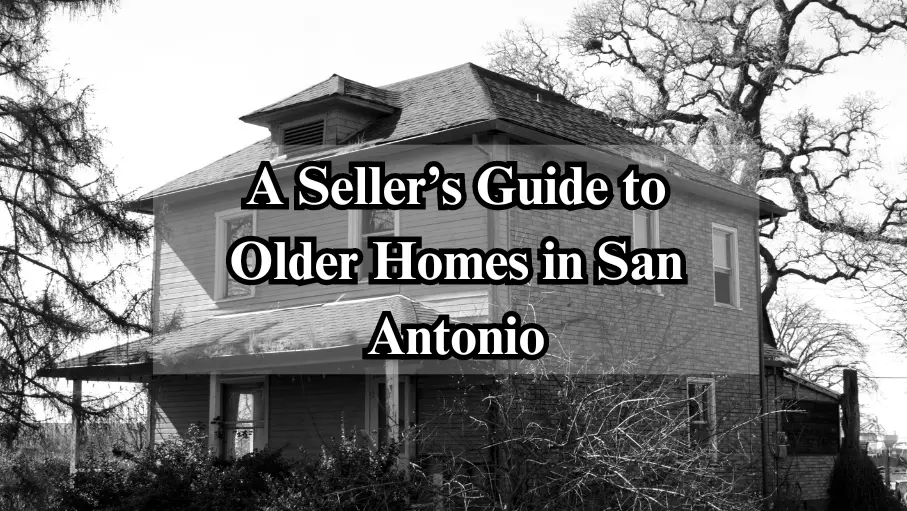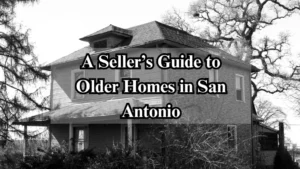The key considerations when selling an older home in San Antonio include understanding the local real estate market, addressing common challenges like structural issues and buyer perceptions, enhancing curb appeal and staging the interior, working with experienced real estate agents, considering financial factors, and being transparent about disclosures and local regulations.
By following these tips and strategies, sellers can successfully navigate the process of selling an older home in San Antonio and achieve a positive outcome. The article provides a comprehensive guide to help sellers make informed decisions and effectively market their properties to attract potential buyers.
Key Takeaways
- Understand the San Antonio real estate market and its unique characteristics.
- Address common challenges like structural issues and buyer perceptions.
- Enhance curb appeal, stage the interior, and market effectively.
- Work with experienced real estate agents and consider financial factors.
- Be transparent about disclosures and local regulations.
Understanding the San Antonio Real Estate Market
Overview of the Current Market Trends
San Antonio’s real estate market has seen significant growth in recent years. According to recent statistics, home prices have steadily increased, making it a competitive market for sellers. However, older homes often have a unique appeal that can attract buyers looking for character and history. As of 2023, the average home price in San Antonio is approximately $350,000, but older homes, especially those in desirable neighborhoods, may command higher prices if marketed effectively.
Importance of Local Knowledge
Understanding the local market is crucial for successfully selling an older home. San Antonio is known for its diverse neighborhoods, each with its charm and character. Familiarity with local amenities, schools, and community features can help you highlight your property’s advantages. Buyers often seek homes in areas that offer a strong sense of community and access to cultural attractions, so knowing your neighborhood can give you a competitive edge.
Common Challenges of Selling Older Homes
Structural and Maintenance Issues
One of the primary challenges of selling an older home is addressing structural and maintenance issues. Older homes may have outdated plumbing, electrical systems, and roofing that require repairs or replacements. Potential buyers may be wary of these issues, fearing significant costs after purchase. To mitigate these concerns, consider getting a pre-inspection before listing your home. This proactive approach allows you to identify and address important issues upfront, giving buyers peace of mind and increasing the likelihood of a successful sale.
Buyer Perceptions and Concerns
Buyers often have preconceived notions about older homes, primarily regarding their condition and potential renovation costs. Many buyers may worry about the need for extensive repairs or updates to meet modern standards. It’s essential to address these concerns in your marketing strategy. Highlight your home’s unique features, such as original hardwood floors or vintage fixtures, while assuring buyers that the home has been well-maintained.
Pricing Challenges
Pricing an older home can be tricky. While you want to maximize your return, overpricing can deter potential buyers. Conduct thorough market research to understand comparable sales in your area. Consider consulting a local real estate agent specializing in older homes to help you set a competitive price based on the home’s condition, location, and current market trends.
Tips for Successfully Selling an Older Home
Enhancing Curb Appeal
First impressions matter, especially when selling an older home. Enhancing curb appeal can significantly impact a buyer’s perception. Simple improvements, such as fresh paint, landscaping, and clean walkways, can make a big difference. Consider these tips to boost curb appeal:
- Landscaping: Trim overgrown bushes, plant colorful flowers, and maintain a tidy lawn.
- Exterior Maintenance: Power wash the exterior, clean gutters, and repaint or touch up any peeling paint.
- Front Door: A new or freshly painted front door can create an inviting entrance.
Staging the Interior
Once you’ve attracted potential buyers with curb appeal, it’s time to focus on the interior. Staging your home can help buyers envision themselves living there. Here are some practical staging tips:
- Declutter: Remove personal items and excess furniture to create a more open and inviting space.
- Neutral Colors: Consider repainting walls in neutral colors to appeal to a broader audience.
- Highlight Unique Features: If your home has original architectural details, such as crown molding or built-in shelves, make sure they are clean and showcased.
Addressing Repairs and Upgrades
Before listing your home, consider making necessary repairs and upgrades. While you may want to avoid undertaking extensive renovations, addressing critical issues can enhance your home’s value and appeal. Focus on:
- Kitchen and Bathroom Updates: Minor updates, like new fixtures or fresh paint, can significantly improve these spaces.
- Energy Efficiency: Consider replacing old windows or adding insulation to improve energy efficiency, which can be a selling point for buyers.
Marketing Strategies
Effective marketing is key to attracting buyers to your older home. Here are some strategies to consider:
- Professional Photography: High-quality images can showcase your home’s best features and attract more interest online.
- Online Listings: Utilize platforms like Zillow, Realtor.com, and social media to reach a wider audience.
- Open Houses: Host open houses to allow potential buyers to experience the home firsthand.
Working with Real Estate Professionals
Partnering with a local real estate agent specializing in older homes can be invaluable. They can provide insights into the market, help you price your home competitively, and develop a tailored marketing strategy. An experienced agent can also navigate negotiations and paperwork, smoothing the selling process.
Financial Considerations
Understanding Closing Costs
When selling a home, it’s essential to understand the various closing costs involved. These can include agent commissions, title insurance, and transfer taxes. On average, sellers expect to pay around 6-7% of the home’s sale price in closing costs. Awareness of these expenses will help you plan your finances accordingly and avoid surprises at the closing table.
Seller Concessions
In a competitive market, offering seller concessions can make your home more attractive to potential buyers. This might include covering some of the closing costs or providing a home warranty. These concessions can help alleviate buyer concerns about potential repairs and make your home stand out.
Pricing Strategies
Setting the right price for your older home is crucial. Consider these strategies:
- Comparative Market Analysis (CMA): Work with your real estate agent to conduct a CMA, comparing your home to similar properties recently sold in your area.
- Price Adjustments: Be prepared to adjust your price based on market feedback. If your home isn’t attracting interest, you may need to reevaluate your pricing strategy.
Legal and Regulatory Considerations
Disclosures and Inspections
Transparency is critical when selling an older home. Many states, including Texas, require sellers to disclose known issues with the property. Being upfront about any repairs or concerns can build trust with potential buyers and reduce the risk of legal disputes later.
Local Regulations
San Antonio has specific regulations that may affect the sale of older homes, particularly those in historic districts. Familiarize yourself with any local preservation laws that may impact renovations or modifications to your property. Working with a knowledgeable real estate agent can help you navigate these regulations.
Conclusion
Successfully selling an older home in San Antonio requires understanding the local market, addressing buyer concerns, and enhancing your home’s appeal. By implementing effective strategies and working with professionals, you can turn challenges into opportunities for a successful sale.
FAQs
What are the everyday challenges of selling an older home in San Antonio?
Common challenges include structural issues, outdated systems, buyer perceptions regarding repairs, and accurately priced pricing based on the home’s condition and market demand.
How can I enhance the curb appeal of my older home?
Curb appeal can be enhanced through landscaping, exterior maintenance, fresh paint, and creating an inviting entrance with a well-maintained front door.
Is it worth investing in repairs before selling my older home?
Yes, addressing necessary repairs can significantly improve your home’s value and appeal, making it more attractive to potential buyers and potentially leading to a quicker sale.
Should I hire a real estate agent to sell my older home?
Hiring a local real estate agent with experience selling older homes can provide valuable insights, help you set a competitive price, and smooth the selling process.
What financial considerations should I consider when selling my home?
Consider closing costs, potential seller concessions, and the importance of setting a competitive price based on market analysis and your home’s condition.










